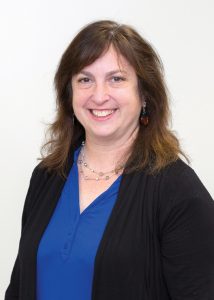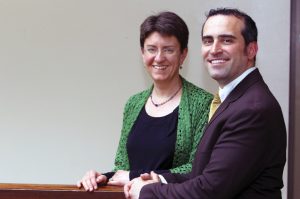Students in Trinity’s Health Fellows Program gain valuable insight into what it really takes to be a physician
By Abe Loomis
Lucy Honeycutt’s interest in medicine started with a jolt.
An avid equestrian, the member of Trinity’s Class of 2018 was just 7 years old when a horse in her family’s barn in rural Maryland kicked her, breaking her jaw. She spent days in a local hospital and never forgot how safe she felt in the care of her doctors and nurses.
“I remember thinking, ‘This is so cool. There are all these people here who are able to fix me!’ ” she says. “And I wanted to help other people in that way, to help other people feel safe.”

Small wonder, then, that her placement through Trinity’s Health Fellows Program with Dr. Duarte Machado ’01 — a co-director of Hartford HealthCare’s Chase Family Movement Disorders Center who also holds an assistant clinical professorship at Yale School of Medicine and who is the first Health Fellows Program alumnus to become a Health Fellows mentor — has been such a good match. Of Machado’s manner with his patients, Honeycutt says, “He really listens, and he’s always friendly. He always starts with an overarching question, and I think that helps him get an understanding of how they’re feeling that isn’t just symptom specific.”
Connecting students with mentors in the health professions has been the business of the Health Fellows Program since 1999, when Priscilla Kehoe, a founder of Trinity’s Neuroscience Program, and Professor of Psychology and Neuroscience Sarah Raskin saw an opportunity.

“We were aware that Hartford Hospital was just a few blocks away,” Raskin says, “and we were both trying to place our students in health care settings within our course work to give them that real-life experience, and so we were thinking about how we could expand that to make it more meaningful.”
Their thinking aligned with that of then-Dean of the Faculty Miller Brown, who also had been considering ways to connect Trinity with Hartford Hospital. Soon they were hard at work designing a curriculum.
“In the initial stages, we used as a template the Legislative Internship Program, which had already existed in the legislative offices in downtown Hartford for students who were interested in going into political work,” Raskin says. “We wanted to make a better experience for our students and also to make Trinity more attractive to students who were interested in health care. Being in a city and being near a medical center is something that Trinity has that most other small liberal arts colleges don’t.”
Essential to their plan — and differentiating it from many other medical internships or “shadowing” programs — was that it would combine a classroom seminar, clinical experience, and serious research. Students now in the Health Fellows Program — which is designed to accommodate about 15 students and this year enrolled a record 20 — read about and discuss the U.S. health care system and current topics in the field; they observe and work with a mentor; and they seek approval for a research project from Hartford Hospital’s Institutional Review Board (IRB), with the ultimate goal of presenting the results at a conference or publishing them in a medical journal.
“We sit with them and their health care mentor,” Raskin says, “and we help them design a research project that the student can do almost independently, something that is feasible within the setting and that will yield data that is, hopefully, useful to their mentor.” Some students have studied cancer cells. Others have worked with mentors at the Anxiety Disorders Center at Hartford Hospital’s Institute of Living.

“We’ve had students on neurosurgical units comparing the outcomes of different neurosurgical procedures,” Raskin says. “Or doing injury-prevention work with victims of domestic violence, or working in the schools with kids in teen-pregnancy prevention programs. It really runs the gamut.”
Honeycutt and Machado are collaborating on a study examining the effect of a multi-strain, high-potency probiotic on people with Parkinson’s disease. For both of them, studying movement disorders is deeply personal. Each had a grandparent who suffered from Parkinson’s, and, partly as a result, each decided to aspire to help people with movement disorders. The overlap in their interests led directly to the research they’re doing now.
“When I met with Lucy for the first time at the end of the fall term, she had been working on the use of a ketogenic diet in a preclinical model of Parkinson’s disease,” Machado says. “We discussed the use of probiotics in Parkinson’s disease and how probiotics are of great interest in the literature that is currently being published about how to modulate the gut flora in Parkinson’s disease.”
They outlined a project together, and then Honeycutt took the lead — developing the proposal, submitting it to the IRB at Hartford Hospital, designing survey tools, and collecting data from patients who agreed to participate. Meanwhile, she was writing weekly papers for her seminar and spending hours in the clinic attending patients with Machado.
“I carry around a little notebook,” Honeycutt says. “I’ll notice the way that a patient’s talking and put a question mark — is this related to the condition they have? Or sometimes Dr. Machado and the patient will start talking and use new medical terminology, so I’ll write down the spelling as best I can and then Google it later to figure out what they were talking about. Or I’ll jot down anything I notice or questions that I have and then answer them when I talk to Dr. Machado.”

Alison Draper directs Trinity’s Interdisciplinary Science Center and teaches the Health Fellows seminar in alternate years opposite Raskin. For students like Honeycutt, Draper says, combining classroom study, clinical work, and research is the best preparation for their next challenge: applying to medical school.
“If we do it right, [the varied requirements of the program] feed into each other,” she says. “Medical schools want to know that students understand what they’re getting themselves into. If a student is naïve about how health care actually works and the realities of life as a physician, then they’re not evaluated as strongly. So we try to help them walk in with their eyes open.”
This summer, while Honeycutt is busy with her applications, Machado — who signed up as a mentor because he loved his own experience as a Health Fellow — will move forward with their Parkinson’s project, working with another student to collect the number of participants needed to complete the study.
 Machado says that by initiating the research, “in a sense, Lucy is also paying it forward — to the next student.”
Machado says that by initiating the research, “in a sense, Lucy is also paying it forward — to the next student.”
Although Honeycutt has yet to settle on a specialty, her experience with Machado in Trinity’s Health Fellows Program has confirmed her desire to pursue medicine and the manner in which she hopes to do so.
“He’s really invested, and it’s inspirational,” she says. “That’s how I want to be.”
Read more about the Hartford Hospital – Trinity Neuroscience Collaboration.